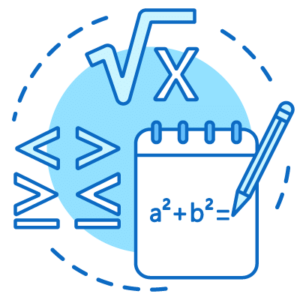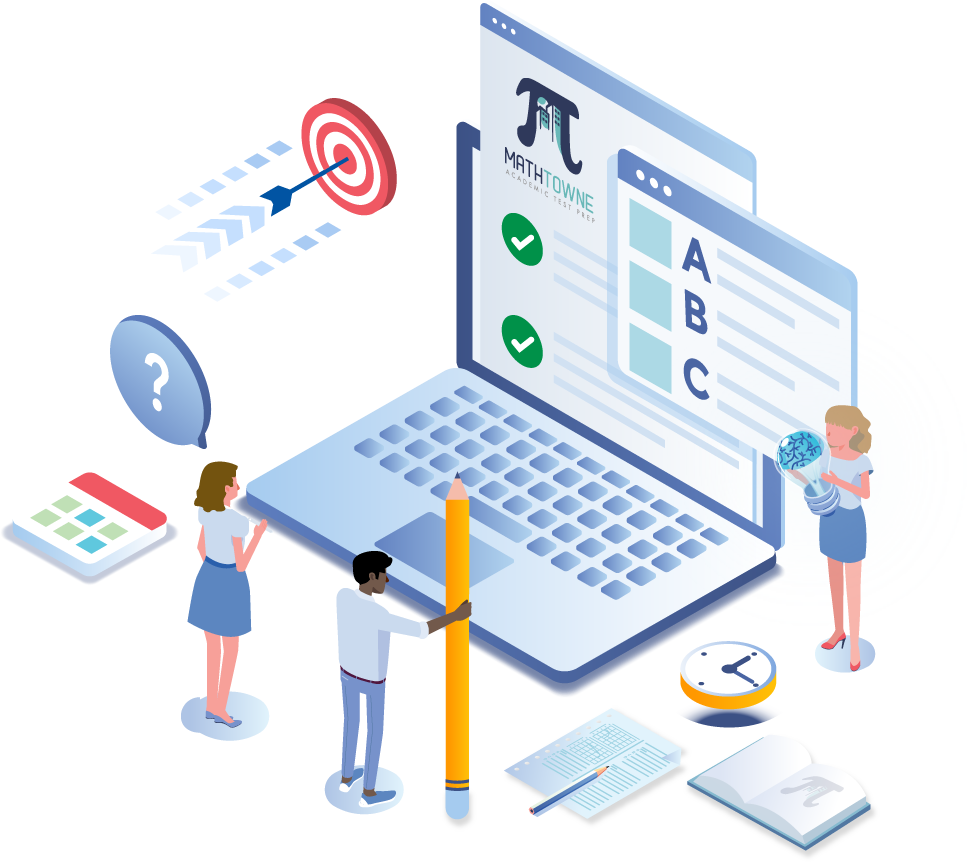Feeling nervous about an upcoming test? Taking tests can be intimidating and overwhelming, but it doesn’t have to be. With the right techniques and study habits, you can improve your confidence and score. These 20 test taking strategies help make the whole test-taking process easier, from preparation before to turning in your completed test.
BEFORE THE TEST
Being prepared before you take a test will help you cut down on a lot of extra worries. Follow these 8 tips to lessen those test-day jitters.
1) Start studying early
It’s best to begin your preparation for the exam well in advance of the test date so that you have ample time to cover the material and revise it multiple times, which is crucial for retaining information in your long-term memory.
Starting early can also help you avoid cramming, which can lead to stress and exhaustion from the overwhelming amount of material you need to cover. When you cram, you might be able to memorize the material temporarily, but you will forget it soon after the exam, making it difficult to apply the knowledge in future classes or in your career.
2) Know what materials the test will be covering.
Making sure that you know what will be on the test allows you to focus your study efforts on the most relevant topics and allocate your time and resources effectively. To gain insight into what the test will cover, it’s essential to review the syllabus, class notes, textbooks, and any study materials provided by the instructor, or ask the teacher for more clarification. This approach helps you identify the key concepts, themes, and topics you need to understand and reinforces your knowledge of the subject matter. By having a clear understanding of what the test will cover, you can tailor your study plan accordingly to improve your chances of a better score.
3) Organize your notes and make sure there aren’t any gaps.
When you have good notes, you can review the material quickly and easily, allowing you to focus on understanding the concepts rather than trying to decipher what you wrote.
To organize your notes, start by separating them by topic or subject area. Use headings and subheadings to create a clear structure and make it easier to locate information quickly. If you have notes from multiple sources, such as lectures, textbooks, or online resources, try to integrate them into a single document to avoid duplication and confusion.
After organizing your notes, check them for gaps. Make sure that you have covered all the necessary topics and concepts and identify any areas where you need more information. This is also an opportunity to review your understanding of the material and ask questions if there are any areas that are unclear. If you were absent from class at all, ask someone if you can borrow their notes to fill in any gaps. Check to see that you haven’t missed any handouts or other important papers from class either.
4) Make a study plan.
By creating a schedule of what you will study and when, you can prioritize your time and resources, focus on your weak areas, and avoid cramming at the last minute.
To create a study plan, start by identifying the key topics and concepts you need to understand for the test. Next, estimate the time required to review each topic and allocate sufficient time to cover all the material adequately. Be realistic in your planning and avoid overloading yourself with too much work at once.
We suggest making test study guides and flashcards or getting a study group together. We also recommend that you quiz yourself on potential test questions. (Quick tip: color-coding your notes can help your brain recall important information more quickly and effectively during a test!)
Once you have created a study plan, make sure to stick to it as much as possible. However, be flexible and adjust your plan as needed to accommodate unexpected events or changes in your schedule. Remember to include regular breaks and rewards for yourself to maintain motivation and reduce stress.
5) Review the material the night before the test, then go to bed early.
To review the material, start by reviewing your notes and summaries of the main topics and concepts covered in the test. Focus on understanding the key ideas rather than memorizing details. Use active recall techniques like quizzing yourself or explaining concepts to someone else to reinforce your knowledge and identify any gaps.
Don’t try to stay up late and cram the night before the test even if you feel like you have more to study – getting enough sleep before a test helps your brain’s ability to focus during the day. Avoid consuming caffeine or other stimulants that may interfere with your sleep quality. If you’re finding it difficult to sleep due to nerves, try to wind down with a calming activity like reading a book, taking a warm bath, or practicing deep breathing or meditation.
6) Eat a healthy breakfast the morning of the test.
Along with getting enough sleep, eating breakfast provides your brain and body with the energy and nutrients needed to stay alert, focused, and productive during the exam.
Choose a breakfast that is high in protein and complex carbohydrates and low in sugar and unhealthy fats. Good options include whole-grain toast, eggs, yogurt, fruit, and nuts. Avoid sugary cereals, pastries, and fried foods, which can cause a sugar crash and make you feel sluggish and distracted.
If you don’t have time for a full breakfast, consider bringing a healthy snack to eat during the break. Good options include fruit, nuts, granola bars, or a small sandwich.
If caffeine makes you jittery, maybe lay off the coffee. Don’t forget to stay hydrated, too!
7) Make sure you have everything you need for the test.
Before heading out to take your test, make sure that you have everything you need for the exam. This includes gathering all your supplies, such as notes, textbooks, pencils or pens, erasers, calculators (if allowed), water bottle, and any other necessary items.
It’s also a good idea to double-check the test instructions for everything that is required. Arriving early to the testing location can provide extra time to get settled and mentally prepared. By taking a few minutes to gather your supplies and arrive early, you can reduce stress and feel confident and ready to tackle the exam.
8) Breathe.
If you feel anxious or overwhelmed as you arrive to class, take a few moments to close your eyes and take a deep breath in through your nose, hold it for a few seconds, and then exhale slowly through your mouth. Repeat this process a few times until you feel more relaxed and centered.
Deep breathing can help increase oxygen flow to your brain, which can improve your cognitive function and mental clarity. It can also help slow down your heart rate and lower your blood pressure, which can reduce physical symptoms of anxiety such as sweating, shaking, and nausea.
Incorporating deep breathing exercises into your routine can help you feel more calm, focused, and in control during the exam.
DURING THE TEST
Here are 12 tips to follow during your test to help you focus and make the best use of the time given.
1) Pay attention to all of the instructions given by the teacher.
Teachers often provide important information about how the test will be structured, what types of questions will be included, and how to approach each section before they hand out the test. They may also provide guidance on how to format your answers, how much time you have to complete the test, and any other important details.
By actively listening to and following the instructions provided by the teacher or the ones provided on the test, you can avoid making mistakes, reduce the likelihood of confusion, and maximize your chances of success. If you have any questions or are unsure about any of the instructions, don’t hesitate to ask your teacher for clarification before beginning the exam. Other students may have questions about the same thing!
2) Go over the whole test before you start.
Before diving into the exam, take a few moments to review the entire test from beginning to end. This test-taking strategy can help you familiarize yourself with the format of the exam, identify any potential challenges or difficulties, and develop a plan for how to tackle each section.
As you review the test, pay attention to the types of questions being asked, the point values assigned to each question, and the time allotted for each section. This way, you can prioritize your efforts and allocate your time wisely. Check for any extra credit questions or additional questions on the backs of pages as well.
By going over the whole test before you start, you can also identify any mistakes or errors you may have made, such as misreading instructions or misunderstanding a question, to avoid making the same mistakes later on in the exam.
3) Do an “info dump” on scratch paper.
If you’re worried about blanking out on important information and if you’re given scratch paper for the test, use the paper to do an “info dump” of any formulas, dates, etc. that you may be worried about forgetting. Take a few minutes at the beginning of the exam, before you answer any questions, to jot down everything you can remember about the subject matter. This may include formulas, key terms, definitions, or other information you studied leading up to the exam.
By getting all this information out of your head and onto the scratch paper, you can free up mental space and focus more effectively on the questions in front of you. Having all the important information in one place can also help you quickly refer back to it throughout the exam, reducing the likelihood of mistakes or oversights. While this isn’t required, it’s often a helpful tool, especially for math or science tests.

4) Answer the questions you know first.
Remember that you do not need to take the test in order! By starting with questions you feel confident about, you can build momentum and gain a sense of progress, which can help you feel more confident and reduce anxiety.
When you first receive the test, quickly scan through the questions to identify any that you feel comfortable answering right away. Then, begin by answering those questions before moving on to the more challenging ones.
Focusing on the questions you know first ensures that you don’t waste time on questions you’re unsure of or spend too much time stuck on one question. This approach can also help you manage your time more effectively, as you can devote more time to the more challenging questions later on.
5) If you are struggling with a question, circle it and revisit it later.
Don’t waste too much time on any question. If you are struggling with a question, it is a good idea to circle it and revisit it later, which allows you to move forward with the rest of the exam without getting stuck on one question or becoming overly anxious.
When you encounter a difficult question, circle it or mark it in some way so that you can easily identify it later. Then, move on to the next question and continue answering as many questions as you can. If you have extra time at the end of the exam, you can go back to the circled questions and spend more time on them.
By circling difficult questions and revisiting them later, you can maintain your momentum and confidence while taking the exam. You also give yourself more time to think about the challenging question, which can help you come up with a more accurate answer.
6) Don’t second-guess yourself.
While it’s important to double-check your work and make sure you haven’t made any careless mistakes, constantly second-guessing your answers can cause unnecessary stress and anxiety, which can negatively impact your performance on the exam.
If you are confident in your answer, trust your instincts and move on to the next question. Second-guessing can lead to overthinking and you may end up changing a correct answer to an incorrect one. Instead, focus on answering each question to the best of your ability and moving forward without dwelling on previous answers.
If you do find that you need to change an answer, make sure you have a valid reason for doing so. Don’t change an answer just because you are second-guessing yourself or are feeling unsure.
7) Give it your best educated guess.
For most tests, an incorrect answer is better than a blank answer. If this is not the case, teachers will usually specify that incorrect answers take off more points (ask them before the test starts, if they haven’t made this clear).
When you are unsure about a question, take the time to read it carefully and eliminate any answers that are clearly incorrect. Then, use your knowledge of the subject and any information provided in the test to make an educated guess.
Sometimes, you may be able to use the process of elimination to narrow down multiple-choice options and make a more informed guess. Other times, you may need to rely on your intuition and make an educated guess based on your overall understanding of the subject matter.
Remember, the goal is not to get every question right, but to maximize your overall score. Most of the time, it’s better to guess based on the facts that you do know. Who knows, you may get it right! If you have absolutely no idea, some questions are better left blank. Use your best judgement.
8) Carefully read through each question.
Sometimes tests will be worded in ways intended to slip you up. This can happen with multiple choice questions (especially on standardized tests). Take your time to read through each question fully and make sure you understand what it is asking before answering it. Quick tip: Underline key words in a question that focus on the important parts to aid in understanding.
9) Try not to get distracted.
This is easier said than done. If you catch yourself losing concentration or getting caught up in what other classmates are doing, bring your focus back to the question in front of you. Do not feel rushed if other students are turning in their tests early and you’re not finished yet. Everyone works at their own pace.
10) Pace yourself.
Keep an eye on the clock. If you feel that you’re rushing, slow down. If you’re lagging behind, circle difficult questions and move on. Make sure you’re using the allotted time to the fullest.
11) Relax.
Remember to breathe. If you find yourself getting stressed or blanking out a lot, pause for a moment. Breathe, collect your thoughts, and then try again.
12) Review your test before turning it in.
Once you’ve answered all the questions you can, read over your whole test. Make sure you’ve completed as much as possible. Reviewing all of your answers and making sure they are neat and readable will help you avoid losing valuable points because of messiness! If you have time, go over any marked questions and give them another shot.
You’re finished! Once that you’re done with your test, try not to worry about your score or how you did. If you’re not confident that you did well, remember there may be opportunities for extra credit or retaking the test later. For right now, go treat yourself to something fun and relaxing! You deserve a break.
Severe Test Anxiety & Learning Disabilities
If you have severe test anxiety or a learning disability, such as ADHD or dyslexia, speak with your teacher beforehand to see if there’s anything they can do to help make your test-taking easier. It is required for schools to make accommodations for students with learning disabilities. Sometimes teachers will allow these students to take the test separately in another room or give them more time to complete the test. For severe test anxiety, see about speaking with a counselor or therapist to help.
SEE ALSO: ACT vs. SAT: Which Test is Right For You?
Sources:
Top 10 Test-Taking Tips for Students | TeacherVision
Use Test-Taking Strategies on Exam Day | Intelligent.com
Test-Taking Tips (for Teens) | Nemours KidsHealth
Test anxiety: Can it be treated? | MayoClinic.org
Need more personalized recommendations?
The above tips and recommendations are broad strokes on study tips. If you have further questions, feel free to contact us for a personal consultation. We look forward to helping you.
About MathTowne
MathTowne is a locally-based tutoring resource. We are here to support students through the key phases of their academic journey: middle school, the transition to high school, all four years of high school, and college preparation. Our staff has years of experience in creating personalized lesson plans for all of our students.

Yuki is a skilled educator with a degree in Chemistry from Carnegie Mellon University. She discovered her passion for teaching math after tutoring at an after-school program. With five years of tutoring experience, Yuki creates a supportive learning environment for students. Outside of tutoring, she enjoys trying new cuisines and playing piano.

